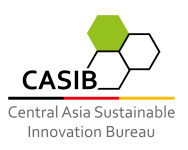On Nov 24-27, the German-Kazakh University (DKU) and CASIB jointly held the entirely digital conference "Silk Road of Knowledge".
For four days, the participants discussed the current challenges of climate change for Central Asia in seven thematic sessions, covering specifically the following aspects:
- climate and climate change
- water and land management
- water and climate security
- infrastructure and logistics
- decarbonisation of energy systems
Session 3, which focussed on Land Management and Food Security under Climate Change, was moderated by the CASIB project office and looked at current advances within the German-Central Asian CLIENT II projects in the category land management: The projects ReKKS, KlimALEZ, ÖkoFlussPlan, KASHEMP and LINOKAS presented themselves and their interim results to then exchange thoughts with regional stakeholders.
Dr. Meurs (DLR Project Management Agency) opened the session on behalf of the BMBF and emphasised the Ministry's long-standing successful involvement in Central Asia, which, as he pointed out, has been gaining in both intensity and quality in recent years. At the end of the session, the participants developed policy recommendations based on the scientific insights gained from the projects to date, which were presented to and discussed with an expert audience of scientists and regional political actors in a closing session. In this process, the project representatives were actively supported by the CLIENT II accompanying project Science-Policy-Interface.
The conference, which turned out very lively despite the lack of personal contact, constituted a valuable contribution towards an intensified exchange – and thus knowledge transfer – between research and politics. The high level of attendance (more than 300 participants) reflects considerable interest in scientific findings and the resulting recommendations with regard to climate change in Central Asia. The event clearly demonstrated the importance of the Central Asian CLIENT II projects in the development of urgently needed climate protection and adaptation strategies for the region.
- Log in to post comments


